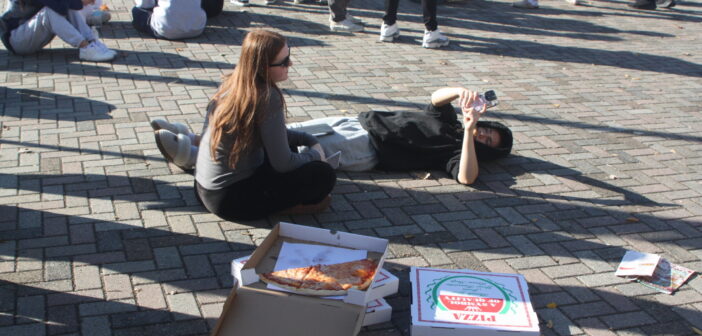Millions of Americans prepare to cast their ballots in the presidential election every four years. Yet, for many, the choice to stay at home and sit out the vote isn’t uncommon.
In recent presidential elections, the percentage of Americans choosing not to vote has remained between 40 and 50% of the population, or about 100 to 125 million eligible voters, according to a study by Michael P. McDonald, a political science professor at the University of Florida.
Professor Michael Hagen of Temple University said there are multiple reasons why people choose not to vote.
“These reasons range from individuals believing that elected officials have little impact on their lives — to those who feel their vote doesn’t matter — to others who simply don’t feel like politics is an area where they have enough expertise,” Hagen said.
Tim Lynch, ‘25, is among those who chose not to vote because he said he believes the president hasn’t affected him personally in the past eight years, and the election result will have minimal impact on his life.
He also said he didn’t notice any major differences between the two administrations during this election cycle.
“When the election is all said and done, I don’t know how drastic the difference would be between the two candidates if they were both in office,” Lynch said. “I don’t think I would notice anything different in my day to day.”
He also said he didn’t feel obligated to vote because his one vote wouldn’t make a difference toward the winner of the election.
G.B.,‘25, asked to be anonymous and also said they chose not to vote, however, they feel “much differently” than Lynch.
“I think my vote has a purpose,” G.B. said. “And that’s why I’m not doing anything with it.”
In Northampton County, which was a key area in the swing state and where they were registered to vote, every vote could make a difference, they said.
G.B. said their decision not to vote stems from their dissatisfaction with both presidential candidates on the ballot. They said they would rather abstain from voting entirely, as they didn’t want their vote to influence either outcome.
Brian Fife, the chair of Lehigh’s political science department, said not voting based on not liking the candidates has been happening since the end of the 18th century.
He said it’s a common way for non-voters to think. However, he urges people to reconsider and cast their vote for “the lesser of two evils.”
For Rebecca Lloyd, ‘25, determining the lesser of two evils was difficult because of the election’s divisive nature.
“I have people that I love and care about that would not talk to me depending on how I voted,” Lloyd said.
Growing up Lloyd said she was raised in a conservative household, and her family urged her to vote for Trump. While at Lehigh, her friends largely lean in the opposite direction, advocating for Harris.
Hagen said surrounding the 2024 election, there was a lot of social pressure to vote.
“Everybody’s telling us to vote and is pushing their ideas on others,” Hagen said. “So if you don’t vote, you kind of feel bad about it.
Lloyd said she would’ve been willing to vote if the people around her didn’t feel so strongly about the election.
“If I didn’t feel like I was going to get ridiculed, then I’d be a lot more inclined to vote,” she said.
Drew Pruyne, ‘25, was someone who had been planning to vote in the election until a few weeks ago when he realized he had forgotten to register.
He assumed same-day registration in his home state of Maine was the norm everywhere.
“I’m disappointed in myself, just because I should’ve made a plan before, now I feel kind of ignorant,” Pruyne said.
Hagen said the voting process in the U.S. is complicated. The process is burdensome on the voters, not on the government, leaving people like Pruyne unable to vote, he said.
Although he never voted, Pruyne said he was relieved to wake up the morning after the election to news that the candidate he was intending on casting his vote for, Trump, had won the election.
“I regret not voting, but thankfully the outcome I wanted to happen did,” he said.
Despite Trump’s win, Lynch said he still feels indifferent about not voting.
G.B. said they have small regrets about not voting after seeing the outcome because they feel the next four years might be “very polarizing.”
All four students didn’t vote in this election but said they plan to vote in the future under different circumstances.






Comment policy
Comments posted to The Brown and White website are reviewed by a moderator before being approved. Incendiary speech or harassing language, including comments targeted at individuals, may be deemed unacceptable and not published. Spam and other soliciting will also be declined.
The Brown and White also reserves the right to not publish entirely anonymous comments.
2 Comments
Wow, the privilege and blissful ignorance of the modern college youth must real nice.
Hey Tim, I don’t know if you noticed, but there are other people in the country besides yourself who count on votes like yours to be able to live. G.B., if you know that your vote is so important, you should know the impact withholding it can have on the well-being of others.
Only goes to show that college isn’t always for the bright ones…
That’s not being part of the solution; that’s being part of the problem. Of all elections, this one mattered. We needed everyone. I wish they had voted.